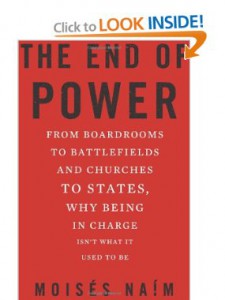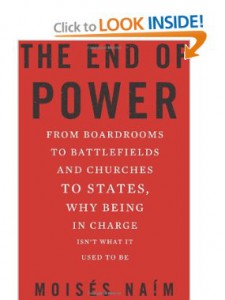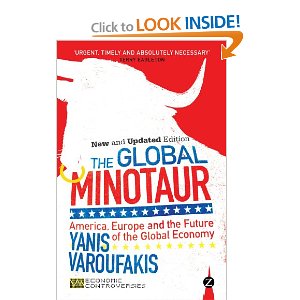
Moises Naim
4.0 out of 5 stars What kind of power, for whom, and for what?, May 31, 2013
By Tom Atlee (Eugene, OR USA) – See all my reviews
Moises Naim's new book THE END OF POWER should properly be called “The Decay of Power”. His thesis is that while it is becoming easier to get power, it is also becoming harder to use it to control others and harder to keep it once you have it.
Naim suggests that globalization, economic growth, a growing global middle class, the spread of democracy, and rapidly expanding telecommunications technologies have changed our world. Together these developments have created a fluid and unpredictable environment which has unsettled the traditional dominions of power.
Three revolutions, he says, “make it more difficult to set up and defend the barriers to power that keep rivals at bay.” He details these revolutions as follows:
* “the More revolution, which is characterized by increases in everything from the number of countries to population size, standards of living, literacy rates, and quantity of products on the market”;
* “the Mobility revolution, which has set people, goods, money, ideas, and values moving at hitherto unimagined rates toward every corner of the planet”; and
* “the Mentality revolution, which reflects the major changes in mindsets, expectations, and aspirations that have accompanied these shifts.”
In other words, says Naim, there is too much going on, too much moving around, too many changing demands and perspectives – and at any time someone new can show up and effectively challenge or undermine your power. In addition, “when people are more numerous and living fuller lives, they become more difficult to regiment and control.” Among other things, such people value transparency, human rights, and fairness to women and minorities – and they share a sense that “things do not need to be as they have always been – that there is always…a better way” and that they need not “take any distribution of power for granted.”
All this is happening at the very time when large hierarchical institutions are losing their “economies of scale” and becoming increasingly difficult to manage, while smaller, more flexible organizations and networks are proving increasingly successful.
Naim provides compelling evidence that power is decaying in all these ways in all fields – from business, governance, geopolitics, and military affairs to religion, philanthropy, labor, and journalism.








